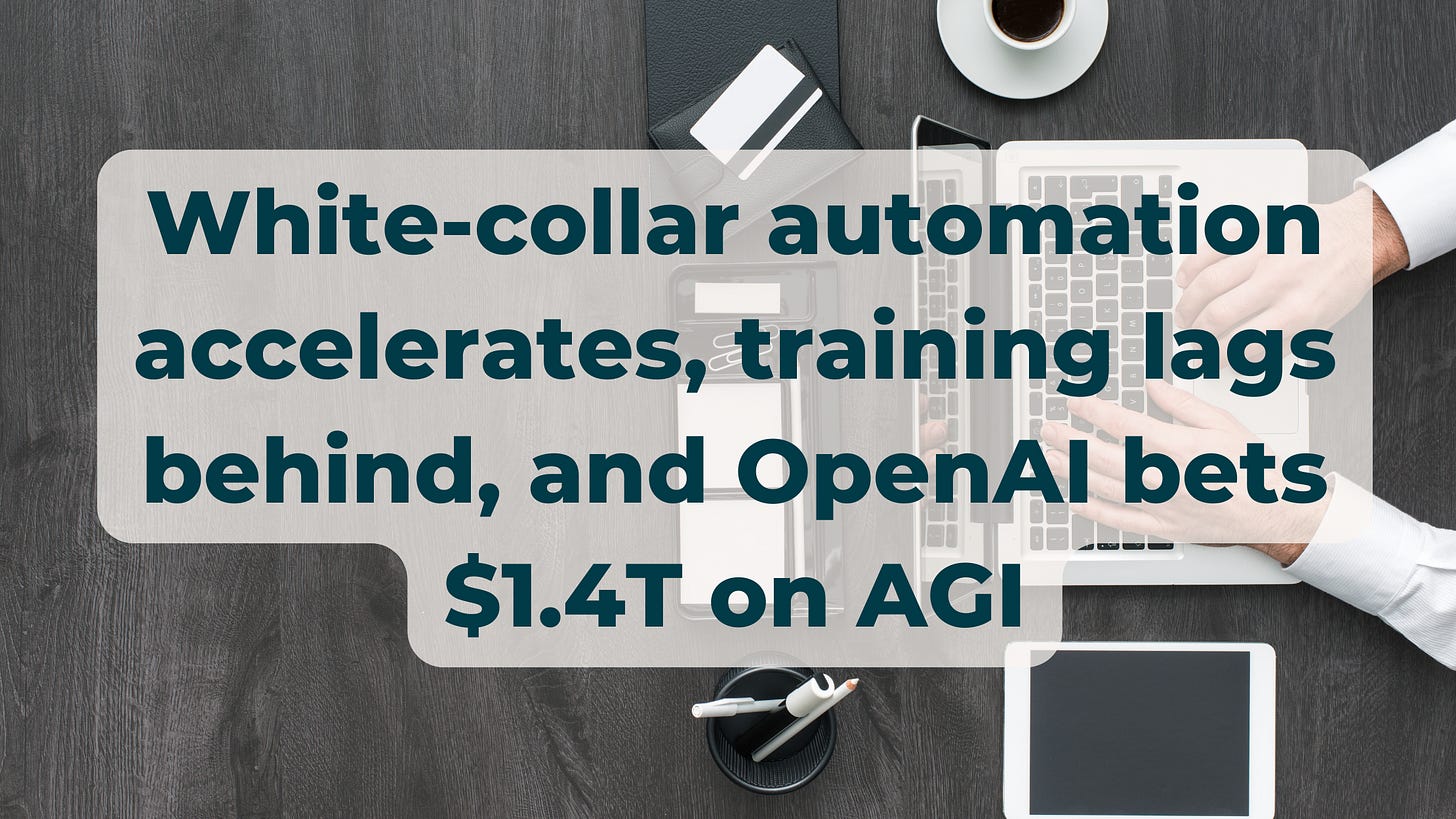This week: White-collar automation accelerates, training lags behind, and OpenAI bets $1.4T on AGI
Plus: Why productivity gains mean nothing without upskilling, and California joins the AI regulation game
Welcome to FullStack HR, and an extra welcome to the 12 people who have signed up since last week.If you haven’t yet subscribed, join the 10000+ smart, curious leaders by subscribing here:
Happy Friday!
I’m contributing to In Good Company, HiBob‘s new HR community!
Why? Because most HR communities are echo chambers where everyone agrees AI is scary and change management needs more slides. The aspiration here is different and I’'ll try to do my part in all of this!
It’s 100% free to join and you join by clicking here!
Now on to the update!
🧠 Topics I’m engaging with
AI is taking white-collar jobs — and there’s much more in the tank, economists warn
Economists are pondering about the hot topic about white-collar jobs. (I also wrote about it this week). Their conclusion is that white-collar automation is just getting started. AI isn’t stuck in pilot programs anymore, it’s coming for entire functions in finance, law, and admin roles. The question isn’t if, it’s how fast you’re preparing for it.
Why this matters: The discussion is shifting from “will AI replace jobs?” to “how fast will it reshape work?” For HR and leadership, that means preparing people and processes for a reality where cognitive automation becomes a structural factor not a temporary wave.
2025 Wharton GBK AI Adoption Report (FULL REPORT)
Wharton’s new study shows that 67% of large U.S. firms now have executive ownership of AI programs, and around 60% already have a Chief AI Officer. Weekly AI use among decision-makers has jumped from 37% in 2023 to 82% this year.
Why this matters: AI has moved from pilot projects to strategy. For HR leaders, this shift means aligning culture, governance, and leadership training with enterprise-level AI ownership and ensuring the “people systems” evolve alongside the tech stack.
The Inclusion Initiative (LSE) x Protiviti: Generational AI Survey 2025
A global study of 3,000 employees finds that people who use AI tools save around one full workday each week, yet 68% of employees haven’t received any AI training in the past year. Those who have been trained not only use AI more but save over twice as many hours per week.
Why this matters: Productivity gains are tied more to training than to the tools themselves. For growing organizations, investing in AI upskilling early is a cultural and strategic advantage and generationally diverse teams show the highest performance uplift.
Civil Rights Council approves new regulations to protect against AI-related employment discrimination
California’s Civil Rights Council has finalized new regulations to protect workers and job applicants from AI-related discrimination in employment decisions.
The rules, effective October 1, 2025, clarify how existing anti-discrimination laws apply when companies use AI, algorithms, or automated-decision systems in areas like recruitment, hiring, and promotion.
Why this matters: California entering the law-game that NYC, EU and others have already entered. This underscores the need for HR to build transparent, auditable AI systems and to collaborate more closely with compliance and legal functions.
⚙️ Tools to try
No new tools this wee but it’s worth noting how Microsoft’s latest Copilot Studio updates (see below) make evaluation and testing of internal agents far more accessible.
🔁 Important updates
Build smarter, test smarter: Agent Evaluation in Microsoft Copilot Studio
Microsoft introduces “Agent Evaluation” in Copilot Studio, a framework for testing and improving agents directly in the development environment.
Sam Altman on what’s next
A TL;DW from Sam Altman. The even shorter version is that they are aiming to have an AI research intern by September 2026, full AI researcher by March 2028. They’re committing $1.4 trillion to compute to make it happen.
They restructured from their weird non-profit setup to a Public Benefit Corporation because the deem that scaling to AGI requires real money. They admit they might fail. But the $1.4T says they’re not planning on it.



This was fantastic! Thank you!